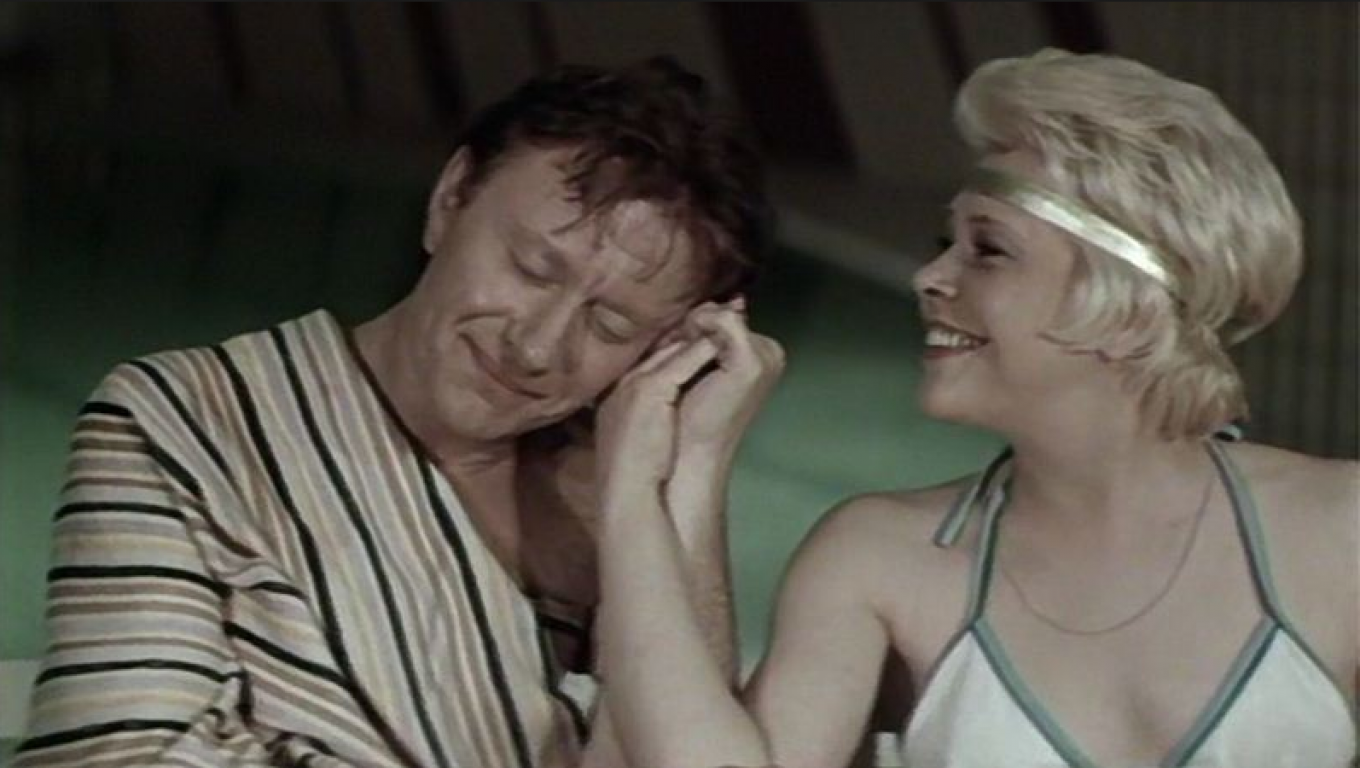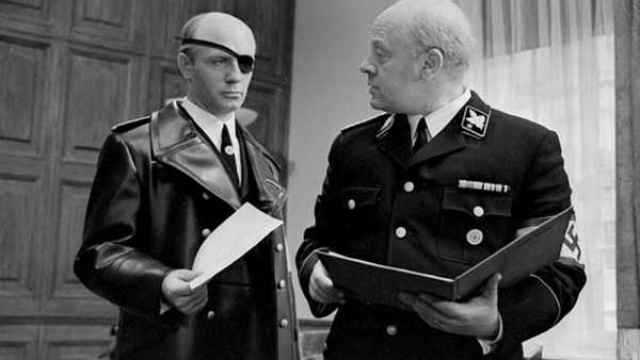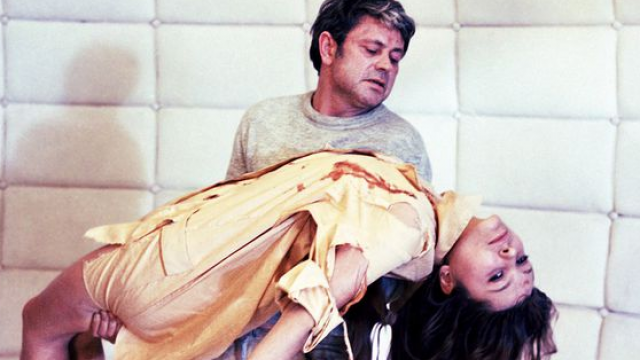It’s Political Disaster Week on Moscow TV, as the small screen offers viewers very good features on a very bad American president, a very bad Russian government and the politics of Soviet food, which was as bad as it sounds. Ah, but after these high-quality downers come two upbeat winners: a great interview with the Rabelais of Russia and an evening of great movie comedies to warm the heavy heart and Slavic soul. Here’s the where and when:
For those who’ve spent the past week wondering how Russians could be so enamored of an incoming U.S. president millions of Americans find vile and repugnant, the Top Secret channel offers a sobering reminder Monday morning that this isn’t the first such cross-cultural anomaly. Alexei Alenin’s fine documentary “Richard Nixon: An American Tragedy” (2008) brings together an impressive cast of Russian professionals who knew and worked with America’s 37th president; the collective wisdom of Viktor Sukhodrev, Georgy Arbatov, Anatoly Dobrynin and others is that the only president ever to resign the office in disgrace was also, in fact, a great contributor to the improvement of Soviet-American relations. If Americans look at Nixon and see a loathsome reptile, “in Russia he is remembered as the first statesman who sought to improve relations with the ideological enemy and put an end to the Cold War.” Tune in for a telling look at the past from another perspective – and perhaps for some useful parallels, actual or potential, for Russian-American relations under a new reptilian president.
Documentary Investigation. “Richard Nixon: An American Tragedy” Документальное расследование. “Ричард Никсон. Американская трагедия” Top Secret, Monday at 8:10 a.m.
The most frightening phrase you can utter within earshot of the Kremlin is “color revolutions,” and there’s no one better to explain what precipitated Russia’s first experience of them – the Red coup d’état of 1917 and the White movement of the subsequent Civil War – than Felix Razumovsky, the nation’s premier TV historian. In Tuesday’s ninth installment of his series “The Adventures of Liberalism in Russia” (2016), Razumovsky relates how the tortuous history of liberal reform in this country reached its high point in February 1917, when the collapse of the Romanov dynasty led to an interim government with a liberal majority.
But alas, the irony of liberalism in power was that it had no power. Ideas and ideals proved scant resources for a government saddled with a legacy of disastrous tsarist policies and radical resistance from within. In a matter of months, state liberalism became a failed state. Razumovsky skillfully summarizes both what happened and what might have, the latter with an eye towards what might still emerge as a force for good in Russian history – and a reason for the Kremlin lights to stay on, one hopes, late at night.
Who Are We? “The Adventures of Liberalism in Russia” Episode 9 Кто мы? "Приключения либерализма в России". Фильм 9-й. Kultura, Tuesday at 10 p.m.

When your state apparatus has the unfortunate habit of banning, burning and bulldozing food, it’s a good idea to remind yourself that a previous government here handled its own self-created food problems even worse — which is one of several useful messages entertainingly conveyed by director Vladimir Bortko’s popular romantic comedy “The Blonde Around the Corner” (1984). “Blonde” tells the story of an impoverished Soviet astrophysicist who's spent decades fruitlessly seeking “alien civilizations” somewhere above. He finally finds one right down the street, where his fellow citizens prosper in distinctly un-socialist ways by manipulating markets — vegetable and meat markets, to be exact — and the hapless star-gazer falls for an appealing blonde doing some brisk “side business” in the local grocery’s deli department.
A film about gaming the Soviet food system was virtually guaranteed problems with the censors, so “Blonde” spent two years on the Lenfilm shelf before finally being released to the public – which ate it up, so to speak, consuming some 24 million tickets. Andrei Mironov and Tatiana Dogileva are fine indeed in the leads, and the film carries a remarkable buoyancy today even as it illustrates why the Soviet Union had less than a decade of shelf-life remaining. Tune in and be glad of heart all over again.
The Blonde Around the Corner Блондинка за углом. Dom Kino, Wednesday at 9:05 p.m.
One of the few remaining cultural comforts of living in Moscow is knowing that Vladimir Voinovich walks among us — literary classic, human rights advocate, public intellectual and, well, really funny guy. These are roles not easily played today, and Voinovich’s outspokenness over the invasion of Ukraine has led to his de facto banishment from state television over the past several years. But every now and then a cable channel airs a good tape from pre-2014 days, as the Top Secret channel is doing this week with “Viktor Nekrasov: An Émigré’s Fate” (2013).
This is far more than a “literary interview,” it is Russia’s great Rabelaisian satirist, who is also a natural storyteller, laying out a treasure trove of history and anecdote centered around the renowned and much missed Nekrasov (1911-1987), whose fate of forced emigration Voinovich shared. Nekrasov was a Soviet anomaly, an outspoken warrior-patriot-internationalist who produced both the World War II classic Front-line Stalingrad (1947) and the heretically sympathetic America/Italy travelogue Both Sides of the Ocean (1962) — two good deeds that state authorities ultimately could not leave unpunished. Interviewer Dmitry Gubin does a good and knowledgeable job of prompting guest Voinovich, giving viewers a rare chance to hear uniquely revealing stories from and about two great Russian writers who were also great friends. Don’t miss them.
Viktor Nekrasov: An Émigré’s Fate Виктор Некрасов. Судьба эмигранта. Top Secret, Wednesday at 5:05 p.m.; Thursday at 11:05 a.m.; and Friday at 11:05 p.m.
Depressed by a world of mean-spirited, willfully ignorant voters and tin-pot hybrid-authoritarian rulers? Dom Kino hears you and has decided to raise your spirits with a rare triple-feature of Eldar Ryazanov comedies Friday night. That’s right, in one jocular evening you get The Unbelievable Adventures of Italians in Russia (1974), Watch Out for the Car (1966) and The Garage (1979), a trio that offers three different ways of chuckling back at life. Expect madcap antics (cleverly Sovietized), a masterfully-played detective-thriller spoof, and social satire so sharp you might cut yourself laughing. Get some popcorn, something good to drink and somebody you like to snuggle with — and you’ll be ready for a night-in you and your battered psyche really deserve.
The Unbelievable Adventures of Italians in Russia Невероятные приключения итальянцев в России. Dom Kino, Friday at 5:00 p.m.
Watch Out for the Car Берегись автомобиля. Dom Kino, Friday at 6:50 p.m.
The Garage Гараж. Dom Kino, Friday at 8:35 p.m.
Mark H. Teeter is the editor of Moscow TV Tonite on Facebook
A Message from The Moscow Times:
Dear readers,
We are facing unprecedented challenges. Russia's Prosecutor General's Office has designated The Moscow Times as an "undesirable" organization, criminalizing our work and putting our staff at risk of prosecution. This follows our earlier unjust labeling as a "foreign agent."
These actions are direct attempts to silence independent journalism in Russia. The authorities claim our work "discredits the decisions of the Russian leadership." We see things differently: we strive to provide accurate, unbiased reporting on Russia.
We, the journalists of The Moscow Times, refuse to be silenced. But to continue our work, we need your help.
Your support, no matter how small, makes a world of difference. If you can, please support us monthly starting from just $2. It's quick to set up, and every contribution makes a significant impact.
By supporting The Moscow Times, you're defending open, independent journalism in the face of repression. Thank you for standing with us.
Remind me later.







